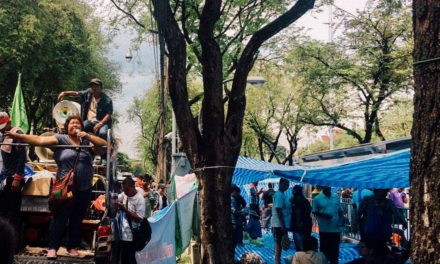By Nicola Bullard
Arriving in Jakarta on Sunday 11 January, two days after the rupiah crashed, and just two hours after the heavies from the IMF, I expected to see the streets burning. News reports from the previous days described panic buying , empty supermarkets and rioting in the provinces. Instead, from the expressway into town, you see banks “ seemingly hundreds of them “ tall glass-clad office towers, testimony to Indonesia’s economic ˜miracle’. If there was such a thing as poetic justice, the buildings should be rubble, or perhaps occupied by the millions who have lost their jobs due to the recent financial collapse or the many more millions who have lost their land to commercial development and industrialisation.
However, the God of Irony has not yet descended on Jakarta, although the God of the IMF has arrived with a vengeance, forcing President Suharto to backdown on his draft budget, stick to the IMF conditions and abandon some of the pet projects designed primarily to benefit his family and friends.
Speculation and rumours were buzzing “ in a subdued kind of way because it was the middle of Ramadan. Former PDP leader Megawati Sukarnoputri had announced that she would be willing to stand as president if no one else in the country had the courage to challenge Suharto. Leaders of the two major Islamic organisations, Amien Rais of the 25 million strong Muhammadiya, and Abdurrachman Wahid of Nahdatul Ulama (about 28 million members), came out in support of Megawati, but fell short of announcing the common platform needed to unite the Muslim traditionalists, progressives, nationalists and democrats.
The greatest fear is that Indonesia will explode. Thirty two years of Suharto has screwed everything down so tight that it’s like a pressure-cooker: there are no cracks to let out the mounting tensions. Conflicts are building up along many fault lines: ethnic, religious, geographic, class, and the alliances and institutions to hold it all together are weak. The end of Ramadan, when university students return and life gets back to ˜normal’, could well be the flash point.
This year Ramadan coincides with the Chinese new year, raising fears that long standing grievances against the predominantly Christian and economically powerful Chinese may come to the surface. In 1997 rioting against Chinese lead many to realise that Suharto — who has relied on them for financial backing in return for a measure of protection “ could no longer guarantee their safety. Rumour has it that Chinese business did a quick calculation and responded by shipping their money offshore precipitating a massive capital flight as early as March last year.
There were also rumours of a military coup, and that Suharto had fled to Germany “ although NGO workers claim that according to their sources, the rumours could be traced back to the US Embassy. Given the US’s history in Indonesia, and their current interest in turning the heat up under Suharto, the explanation seems plausible. (The only question that remains is why Germany?)
People brave enough to speculate hope for the best, and expect the worst. Maybe the opposition can get itself organised in a united front to oppose Suharto “ this would mean a coalition of traditional and progressive Islamic groups with leftists, nationalists and even some factions of the military. The more likely possibility is that the Golkar, Suharto, the military and the conservative Islamic elements will find a mutually acceptable vice-presidential candidate, hoping for a smooth transition whenever Suharto’s star declines. Recent indications, though, of Suharto’s preference for B.J. Habibie, currently minister for science and technology and overseer of some of Indonesia’s more extravagant national development plans, are bound to scare the IMF and the US who are hell bent on shaking down the Indonesian economy. The Financial Times reports that Habibie is in favour of (gasp!) import substitution and subsidies. For the IMF technocrats, this is about as heretical as it gets and they will waste no time ensuring that either Habibie’s political aspirations or economic thinking change pretty swiftly.
Not that anyone should waste any sympathy on Suharto, but he is between a rock and a hard place. Typically, the US has played the democracy card too late in the game (as in Zaire, Malawi, the Philippines “ just to name a few recent examples) but, once on the table, will play it for all it’s worth. The IMF and the US have perfected the œgood cop-bad cop routine, and will make all sorts of promises about bailouts and financial assistance just so long as Indonesia agrees to trade and investment liberalisation.
If nothing else the financial crisis has finally pushed the international media and politicians to acknowledge the massive democracy deficit in Indonesia – something that has been blindingly obvious to millions of Indonesians for a long time.
The unrest and discontent in Indonesia will be hard to control, a grim prospect for those with vivid memories of the 1965 bloodbath. After years of authoritarian rule, the opposition is weak and disunited and there is no clear platform or alternative, grievances may flare up and revenge may be sought in ways that are unpredictable and uncontrollable. Maybe next time I go to Jakarta, the streets will be burning.







